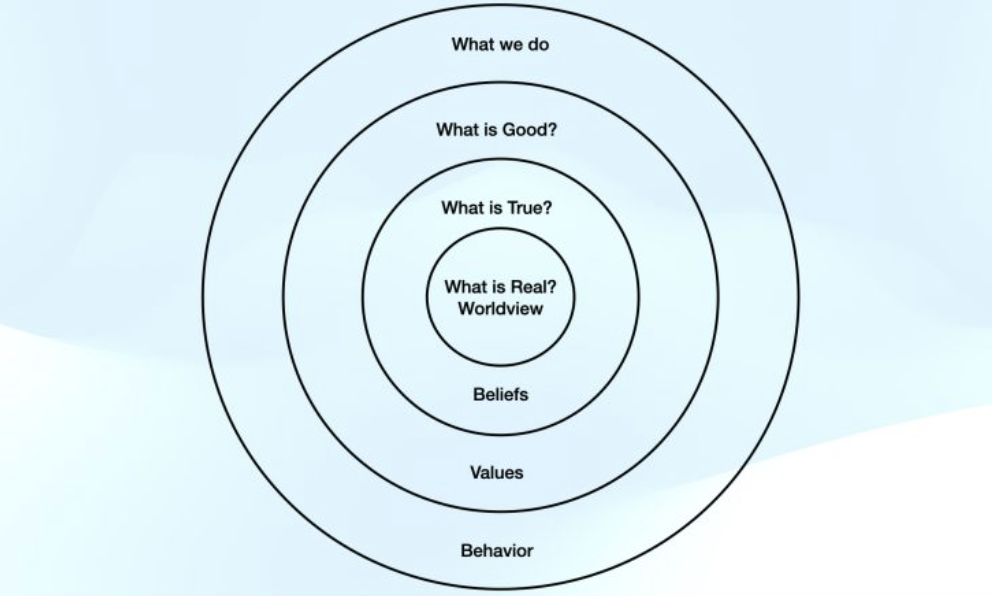Values: The Key to Connection
A non-believer once asked me, “why do Christians get married so quickly?” He had a point; young, secular dating relationships are often much longer than those of Christians. I answered with a myriad of contributing factors, but one that we focused on is the process of discerning compatibility. From what I’ve witnessed in worldly dating relationships, they get to know someone starting with the surface level and work their way deeper, eventually moving from “what do you like to do for fun?” to “what’s your purpose in life?”. Christians often work their way from the deepest beliefs towards the surface because from the start, you can assume that you share the same primary beliefs and guiding principles for life, which makes it easier to determine quickly that you are aligned on the most important questions. Not only does this impact the way we date, but it also affects the way we make friends and share the gospel.
This diagram shows the layers of a person’s worldview (a person’s comprehensive perspective on existence). Take a second to look over this diagram and ask yourself one question, “is there someone I know that I’d be able to confidently identify multiple aspects for each layer of their perspective?”. I’m willing to bet that anyone that comes to mind is a person you feel close to, and the chances are high that they know those things about you. To understand someone’s worldview is to understand them as a person, and when you find someone that aligns with your perspective, genuine connection sparks in a unique and profound way!
The hard part is starting from scratch, figuring out how to unearth each layer and discerning who you share commonalities with. Whether you’re trying to make a friend, build an evangelistic relationship, or pursue a romantic relationship, it is common to hit a wall, like there’s a point where the relationship needs to take a turn one way or another. It leads you to ask the question, “is it worth continuing to pursue this? Or should we move on?”
I’d argue that the layer that this wall is often the values layer. And although relationships with believers and non-believers move in different directions, I believe addressing one-another’s values unlocks the opportunity to truly connect with people.
Let’s say I’m a college student wanting to share the gospel with my non-believer classmates. I know I want to share my faith, but it feels weird to get that deep that quickly, so I start with asking about their weekend and chatting about class assignments. So how do I get from surface level conversation to the spiritual realities of the gospel?
The question that will always take you one step deeper is “why?”. Any answer to a simple “why” question reveals a value, an opportunity to either connect on that value or ask more curious questions. For example, “why did you choose your major?” could give you a glimpse into their passions and priorities for life, or lack thereof. This conversation opens an opportunity to hear about their personal background and their vision for the future, and if you share any common perspectives on this matter, you can share about yours!
In Christian community, you’re often openly discussing what is real and how that shapes your beliefs. Think of small groups — you are regularly discussing spiritual truth through reading scripture, and you share your struggles and prayer requests with others. But there is often a struggle to take those relationships outside of the group, to identify the people you would want to casually hang out with and truly call “friend”.
If you’re wanting to gauge someone’s values in friendships, I think the best way to find out is to ask! One of the most helpful questions I’ve asked in ambiguous friendships is “what are the 5 things you value most in friendships?” (Ie. consistency, transparency, spontaneity, encouragement, etc.). Or you can ask a little less straight-forward question: “what’s your ideal birthday party?”. Take some time to consider what their answer says about their values in friendship. Then you can ask yourself how much you’d enjoy attending their hypothetical ideal birthday party.
Our values are the key link between what we do and what we believe. I can admit, it feels a little strange to ask directly about someone’s personal values, but in a culture that is more isolated than ever, we can use all the help we can get to build stronger connections. Values are the key that unlocks lasting friendships in Christian circles and evangelistic relationships with the lost!


